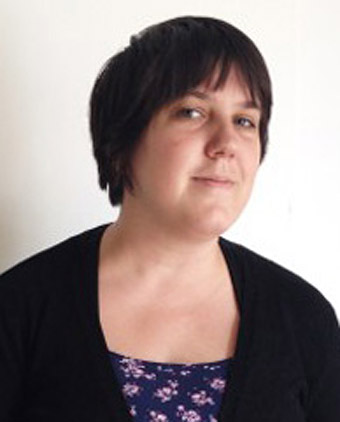
Liz Yerby grew up in Baton Rouge, LA, but has lived in Portland since 2010. Since then she’s gotten a Bachelor’s in Russian from Portland State.
Currently she volunteers at the IPRC and Museum of Contemporary Craft, and does odd jobs, which include teaching the Bindfast class at the IPRC and giving occasional tours at MoCC. She’s made a lot of zines about Russia, and most recently finished a comics zine “We’ve got Blue Jello” about growing up in Louisiana.
What is a “comic” in your opinion? Does it differ heavily from a “graphic novel?” As someone peering in from the outside, I’m curious how you consider genre with regards to your art. Since the word is derived from comedy, are comics funnier, whereas graphic novels are more serious?
I have a pretty open definition of comics and graphic novels and art in general. I don’t think comics are defined by tone. That said, I think we expect a comic strip to end in a joke, but that’s just an element you can play with. I love journal comics, because I think comics already seem so personal, and because we expect them to be funny, they can really highlight how serious, sad or absurd real life can be. Last week at a drawing group with some IPRC friends, I added the final panel to a jam comic, which had a slight joke to it, but was mainly really sentimental, and I made myself and Andrew Panell (amazing artist/2014 IPRC comics certificate grad) cry. Making people laugh and cry is pretty magical, and that is part of why I like art and comics so much.
What about the IPRC’s certificate program enticed you? And how important is the IPRC and Portland’s artistic community to your own work?
It’s hard to make friends and find a sense of community as an adult but it’s amazing how easy it has been to do that at the IPRC. I’m pretty nervous with art, and it helps that at the IPRC I can be around friends and get constant feedback. Also, I’ve gained a lot of skills helping others during my volunteer shifts. I’ve learned a lot of Photoshop and InDesign by having people ask me how to do something, and then googling it with them.
I was thinking about that, and it made me realize how much I miss school. Also I had a lot of friends who were doing the comics program last year and really enjoyed it, so it seemed like a natural choice to do the certificate program.
Who are your favorite visual artists? Who are your favorite writers? And do you ever find it challenging to combine the two—writing and art—into one solidified comic-based thing?
Those are really big questions! Favorite artists include awesome journal comic writers (Vanessa Davis, Julie Delporte, Erika Moen and Lucy Knisley), to really distinctive Russian artists I heard about in college (like Ivan Bilibin, Varvara Stepanova), to local artists I follow like Nikki McClure and Maryanna Hoggatt, to my talented friends at the IPRC, and my big brother, Andrew. I like writing that is pretty conversational. I’m a huge fan of Kurt Vonnegut and I deeply love A Confederacy of Dunces and The Master and Margarita. And yes, combining text and drawing makes me really nervous. There are some things I’m afraid of writing down, and other things I’m afraid of drawing. I’ve also never considered myself a writer, so it took me a long time to even let myself put words on drawings.
What is your ideal workshop experience? And how important is constructive criticism to your artistic vision(s)?
I think the best critiques feel a bit rough, and your peers pick out those issues you’ve been avoiding, like those things I’m afraid to write or draw. Basically a good critique forces you to try new things. And in the best case scenario you’re around supportive people who won’t judge you when you’re trying new things, and maybe want to help you figure out how to approach them.
As the recipient of the 2014 IPRC Dylan Williams scholarship, you’re kind of a big deal. Have you allowed success to get to your head?
Haha, maybe? But I also have big, scary moments of self-doubt, which I assume is normal, and I try and keep it balanced out, even if it means being too proud for a while.
Finally, you volunteer at the IPRC regularly and are a whiz at doing all the things—letterpress/binding/screen printing—that I am bad at. How do you live with yourself?
I don’t actually do screenprinting! But it’s on my to-learn list. I did a lot of overambitious art when I was young that turned out terrible, and so I feel like I totally deserve the good art streak I’ve been having. Like when I was young I’d do a lot of unflattering portraits of people, and always forget to reverse my letters on graffiti stencils. And now my portraits are beautiful and I’m always amazed how my letters are all facing the right direction in letterpress prints. It really helps me to see art as this life-long process, so that I can forgive my mistakes and also so that I can really appreciate any successes.

